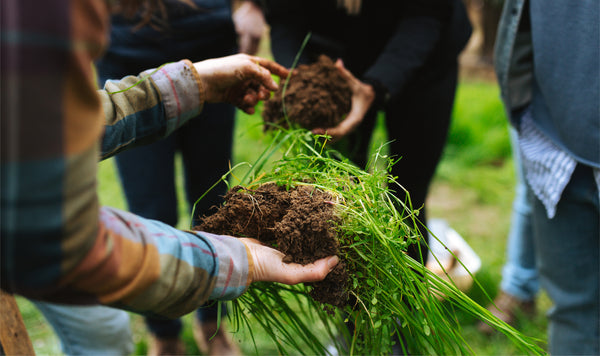Aug 07, 2023
Farm Bill 2023: The future of our food system is in our hands.

This September, the 2023 Farm Bill is being reviewed, which will shape the future of our food system. There’s $100B in annual funding available for farmer support, hunger relief (SNAP), and environmental protections and we have the ability to influence how this bill can evolve and bring to life the system we want our grandchildren to inherit.
The way we grow, distribute, source and eat our food has shifted a tremendous amount since the first Farm Bill was written about 90 years ago, coming out of the Dust Bowl and the Great Depression. And the world we live in continues to change. We believe in the importance of evolving our food system towards non-extractive methods of agriculture that support the health of our land and our communities.
The current farm bill infrastructure supports industrial agriculture practices that prioritize commodities over communities, but if we shift our resources to focus on regenerative agriculture and equitable land access, we can reprioritize a healthy and sustained future for our food system.
Cappello’s relies on healthy soil and the communities who grow, harvest and ship our ingredients. We also understand the importance of how our work impacts our food system for future generations. It’s a responsibility we feel honored to hold, and is why we're supporting groups like Regenerate America and National Young Farmers Coalition who are pushing for regenerative farming and equitable land access to be included in the 2023 Farm Bill.
What is regenerative agriculture?
Regenerative agriculture is a living systems approach to farming modeled after indigenous practices that focuses on making sure the soil is healthy and full of nutrients, and that plants and animals can thrive where our food is grown. It can be visualized as a food forest: thriving grasses and plant life blowing in the breeze, animals grazing and fertilizing, bees pollinating- all in harmony and in relationship with one another. Just like nature intended. These practices meaningfully support our climate by capturing carbon and using the precious resource of water much more efficiently.
As opposed to extractive industrial agricultural practices— picture dusty, barren soil with rows and rows of one crop. The land sprayed with chemicals to deter biodiversity of plants, animals and insects. In short, a kind of desert.
What is equitable land access?
Equitable land access ensures that farmers who are Black, Indigenous, and People of Color (BIPOC) get a piece of the pie. With a history of discrimination and dispossession, and nearly half the US farmland on the verge of changing hands, it’s important to ensure this land transitions equitably to the next generation.
Join us to extend our impact!
—

